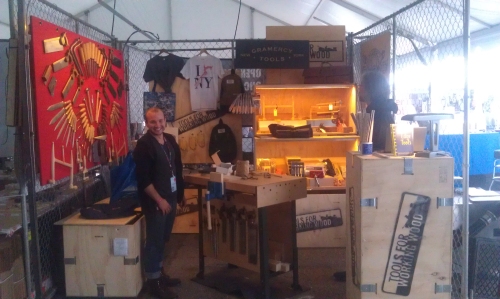 The master bedroom at Biltmore (the largest estate ever built in the USA), is larger than my entire apartment, and is situated at one corner of the building. There are two major monumental doors to the room, the main entrance and a side door that goes into a corridor that leads to the bedroom of the master's wife. Both doorways are framed with huge crown molding, and at the top of the walls are more crown that are mitered into the door frames. It's big, expensive, monumental, and wrong. If you look closely someone must have miscalculated something and one side of the wall crown molding hits the door frame molding at the wrong spot. It's been years but IIRC about 4" off. The master bedroom at Biltmore (the largest estate ever built in the USA), is larger than my entire apartment, and is situated at one corner of the building. There are two major monumental doors to the room, the main entrance and a side door that goes into a corridor that leads to the bedroom of the master's wife. Both doorways are framed with huge crown molding, and at the top of the walls are more crown that are mitered into the door frames. It's big, expensive, monumental, and wrong. If you look closely someone must have miscalculated something and one side of the wall crown molding hits the door frame molding at the wrong spot. It's been years but IIRC about 4" off.
Someone, a far more skilled craftsman than I, figured out that he could either pretend he didn't see it, or not finish the job on time. Fixing it would mean ripping out most of the molding in the room. He also made the correct assumption that except for the architect and a half dozen craftsmen on the job, nobody would notice and the chances of the client noticing were near zero.
Part of being a master craftsman is understanding that making something, getting it done, getting to the next step, is sometimes far more important than perfection. This doesn't mean that the craftsman in the case and his crew were sloppy or incapable of perfection - all the rest of the woodwork is awesomely perfect - he just knew that part of being a professional is knowing when he was beat.
The number of woodworkers, especially beginners, I know who spend more time obsessing on the correct angle for sharpening a tool, instead of just sharpening the tool and over time trying different ways is pretty high. They tell me that "I want to start off doing it right" but the problem is that by the time they have read everything, considered everything, they are just too exhausted to do anything.
But it's not just woodworkers. Making stuff is both extremely satisfying, you get what you want, but also extremely frustrating. You never get exactly what you imagine. We see the defects on the underside of the table. We ignore the ooh and aahs of our family as we are wondering when we will be able to get that small dent that only we know about out and when we can put a better finish on the piece. For the perfectionist it can be paralyzing.
I have written every line of our website, backend, and content management system. My staff do a tremendous amount of graphic and functional input, but I do all the actual coding. I like doing it. But I am constantly discouraged by the stuff that doesn't work the way it should in my mind's eye. The glass is always half empty.
Some makers deal with this by lowering their standards. The smart ones amongst us deal with it by complaining loudly in the shower and try to dwell on the good stuff. Everyone loves the table! You finally don't have to worry about the old table collapsing! The unseen dent will be joined by more dents and scuffs as the table is used! These folks go on to bigger and better stuff.
The frustrated people give up. They can't find satisfaction in making things the best they can, and getting satisfied in the success. I feel sorry for them. But at least with bought furniture they can blame a distant manufacturer for their unhappiness.
Make Magazine is the antithesis of perfection. Their premise is that it is far more important to get stuff done, even messily, than not do it at all. Consequently, this past month at Maker Faire in Flushing we saw all sorts of projects, from things that manage to breath fire without out making the park explode, to electronic and wooden constructions of all kind. Some projects have better fit and finish than other projects but they are share one thing in common: They mostly work!! They are out there, they are not in someone's mind's eye.
The fair was overflowing with people and lots and lost of kids. Maker Faire didn't teach them how to be a master craftsman but I hope it inspired thousands to use hands and brains to do some fun stuff. THe picture above is of our booth a few minutes before the doors opened.
This Friday and Saturday - October 18th and 19th, we will be in Cincinnati at Woodworking In America (WIA). You are going to see lots of great stuff and tools ranging from very nice to spectacular. The sensibilities are WIA are very different than Maker Faire. Here the stress is on skill building, because as makers if we don't reach higher all the time, we won't ever be able to produce what we see in our mind's eye. So come visit us at WIA. this year, along with kids spouses get into the marketplace free. And stop by our booth, check out our wares and pick up a FREE, made in USA, tool to take home with you (while supplies last).
|
 Joel's Blog
Joel's Blog Built-It Blog
Built-It Blog Video Roundup
Video Roundup Classes & Events
Classes & Events Work Magazine
Work Magazine


 The master bedroom at
The master bedroom at
I might add that I have long felt that amateurs, in theory any way, should be able to produce work to a higher standard than professionals for only amateurs are free to lavish as much time and energy on a project as perfection requires, free from any cost or time restraints.
A friend of mine mentioned to me a few years ago that he has been hassling his employer for "decisiveness training" at every year-end review, something I'd never heard of, but if it would work, would probably be beneficial for most.
The other factor involved (other than the speed and volume of decisions) is the quality of decisions, which some people will probably never master. Some of us can't make quality decisions on design, and need to learn to rely on others for design in general. And some can't make quality decisions at all, and any attempt to "ram it through" the process just yields nasty work.
Those types might like to make bread instead, which still gives you the maker feeling.
Sometimes, there are things that we do where success never seems to come, at least not fully satisfying, and for those, it's nice to count failed attempts in earnest as successes themselves, because the successful attempt will not come without them.
And lastly, a lot of us need to get over egos and schooling that tell us we should value a pissing contest mentality of "i never make a mistake" over all other things. In the world of people we enjoy being around, those who can always prove to us that they're never wrong or never fail or that research something 10x more than us before they make a single physical movement usually aren't enjoyable company.